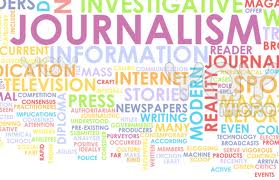Journalistic writing Joseph Pulitzer, a famous publisher in the 1800s, stressed one of the most important qualities of journalistic writing in his memorable command: “ Accuracy! Accuracy! Accuracy!” Roger Mudd’s quote on the first slide refers to another important quality of journalistic writing: objectivity. In addition, all journalistic writing should be clear, concise and colorful. Nothing is more embarrassing or unprofessional than writing and publishing a story that has factual inaccuracies. As a reporter, we were responsible for the information printed in your story. Review everything carefully. Our reputation, and that of your publication, is at stake. Double-check the spellings of student, faculty, and staff names, as well as grade levels and titles. Refer to official documents listing this information, such as homeroom lists or a school directory. Keep a current phone book and an atlas handy to double-check the names of organizations and places. Double-check dates, using a calendar […]
Uses and Gratifications Approach
Uses and Gratifications One influential tradition in media research is referred to as ‘uses and gratifications’ (occasionally ‘needs and gratifications’). This approach focuses on why people use particular media rather than on content. In contrast to the concern of the ‘media effects’ tradition with ‘what media do to people’ (which assumes a homogeneous mass audience and a ‘hypodermic’ view of media), U & G can be seen as part of a broader trend amongst media researchers which is more concerned with ‘what people do with media’, allowing for a variety of responses and interpretations. However, some commentators have argued that gratifications could also be seen as effects: e.g. thrillers are likely to generate very similar responses amongst most viewers. And who could say that they never watch more TV than they had intended to? Watching TV helps to shape audience needs and expectations. U & G arose originally in the 1940s and underwent a revival […]
differences between spoken and written language
Spoken language Spoken language is a form of human communication in which words derived from a large vocabulary (usually at least 10,000) together with a diverse variety of names are uttered through or with the mouth. All words are made up from a limited set of vowels and consonants. The spoken words they make are stringed into syntactically organized sentences and phrases. The vocabulary and syntax together with the speech sounds it uses define its identity as a Particular language. Some human languages exist with their own vocabularies and syntax that are not spoken but use sign gestures. Sign languages have the same natural origin as spoken languages, and the same grammatical complexities, but use the hands, arms, and face rather than parts of the mouth as their place of articulation. Many spoken languages are written. However, even today, there are many world languages that can be spoken but have […]
differences between spoken and written language
Spoken language Spoken language is a form of human communication in which words derived from a large vocabulary (usually at least 10,000) together with a diverse variety of names are uttered through or with the mouth. All words are made up from a limited set of vowels and consonants. The spoken words they make are stringed into syntactically organized sentences and phrases. The vocabulary and syntax together with the speech sounds it uses define its identity as a Particular language. Some human languages exist with their own vocabularies and syntax that are not spoken but use sign gestures. Sign languages have the same natural origin as spoken languages, and the same grammatical complexities, but use the hands, arms, and face rather than parts of the mouth as their place of articulation. Many spoken languages are written. However, even today, there are many world languages that can be spoken but have […]
How you would differentiate between linguistics and non-linguistics communication?
Explain the concept of Linguistic and non-linguistic Communication? DIFFERENCE BETWEEN LINGUISTIC AND NON LINGUISTIC COMMUNICATION As language may not always be used to communicate, so also communication may be possible without necessarily using spoken language. For example sign language. Deaf and dumb people have their own non-linguistic code (gestures and hands signs) to express themselves or to communicate with one another. The linguistic key is the tone, manner or spirit in which an act is performed. Linguistic communication differs from non-linguistic communication. For communicating linguistically, the whole language is available. Sometimes one can communicate in even more than one language, whereas the choices are limited for a non-linguistic communicator, such as, facial expressions, signs and gestures, movements of hands etc. An interesting point here is that even linguistic communication is accompanied by certain elements of non-linguistic communication. While talking a speaker often uses facial expressions and hand movements to convey […]
Effects of mass media on society
Effects of mass media on society Effects of Mass Media can be definedas any change induced directly or indirectly through newspapers, films, radioand television. In the 19th century, the communication experts were of the viewthat access by the mass of population to the printed word might turn docilityinto uprising. The new man medium of cinema was similarly accused of wide rangeof effects while T.V. in the eyes of some is responsible for many of the illsof our time as though such media could be somehow divorced from social,political and cultural environments which produce them. The timing of communication process,writes C.Seymour-Ure in the Political Impact of Mass Media (UK contable, 1974),is probably one of the most important determinants of mass media effects. Ifthe timing is right, the media can often be the arbiter of crisis, by being inthe most prominent position to define it. Because, of the agenda settingtechnique, the media […]
